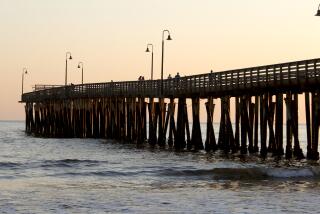Developer Selling Disputed Land in Las Pulgas Canyon
Opposed by neighbors and beset by problems with the state Coastal Commission, a real estate developer has abandoned his two-year effort to develop Las Pulgas Canyon in Pacific Palisades and has placed the property up for sale.
Among the last undeveloped coastal canyons in Los Angeles, the 26-acre property is being advertised for $10.5 million, about $9 million more than developer Neil Senturia paid for it less than three years ago.
“We’re not ready to declare victory, but we’re thrilled that he appears to have thrown in the towel,” said Ron Wolf, president of Save Las Pulgas Canyon Inc., which opposed Senturia’s plan to build up to 50 houses in the landslide-plagued canyon.
Group members are pushing a plan to have area residents join forces with the state and city governments to buy the canyon for use as a park or nature preserve. They say the plan has been warmly received by City Councilman Marvin Braude and state Sen. Herschel Rosenthal (D-Los Angeles).
Senturia, who heads Senturia Investments Inc. of San Diego, did not return phone calls.
However, Paul Pekar, a broker with the Jon Douglas Co., which listed the property, said it has been for sale since December. “We’ve had several expressions of interest; that’s about all I would care to say,” he said.
The rugged canyon borders Sunset Boulevard just north of Temescal Canyon Road and funnels out to Pacific Coast Highway, offering a stunning ocean view.
Although the natural beauty of the property has long attracted hikers, picnickers and even a few filmmakers, its natural hazards have put off would-be developers, who had to contend with crumbling hillsides, unstable fill and a flood plain that caused a concrete dam to burst 10 years ago.
Environmentalists have long argued that the canyon is unfit for any large development, citing a landslide that destroyed two homes at the top of the canyon in 1962, and another slide in 1983 that caused the closure of Pacific Coast Highway.
Senturia’s problems began after he cut a road into the canyon and did other grading there in 1988 without the permission of the Coastal Commission. Residents above the canyon were outraged, fearing that further work in the canyon might jeopardize their hillside residences.
Coastal Commission Chairman Michael Wornum called it one of the worst violations he had ever seen.
Last January, the commission agreed to issue an after-the-fact permit to construct the road and conduct geological tests in the canyon on the condition that Senturia repair the damage. However, coastal officials say Senturia never complied.
“We’re still actively pursuing compliance in the case, and in the event the property is sold, we will continue to pursue the matter,” said Nancy Cave, the commission’s chief enforcement officer.
Senturia bought the canyon in 1987 at the fire-sale price of $1.6 million from the owner of an excavation company who dumped fill in the property over many years.
Senturia’s opponents say this is not the first time that he has attempted to sell the property. “We have brochures he had printed, offering the property for $30 million through a real estate firm in Hawaii last year,” said Jacques Beugelmans, an area resident.
Residents have called the $10.5-million price tag “unrealistically high,” and insist that, after Senturia’s experience, other would-be developers may shy away.
“No one with any brains will try to do what he did,” resident Lloyd Ahern said. “We beat the guy (Senturia) when we weren’t even organized. Knowing what we know now, can you imagine the problems the next developer would have?”
The Santa Monica Mountains Conservancy last year awarded a $35,000 grant to a San Francisco-area research firm that is soon to conduct a study aimed at determining how the canyon may best be put to public use.
“We’re optimistic about the canyon, but we want to be careful at the same time,” Beugelmans said. “There’s always the possibility that a foreign investor could come in and snap it up.”
More to Read
Sign up for Essential California
The most important California stories and recommendations in your inbox every morning.
You may occasionally receive promotional content from the Los Angeles Times.










